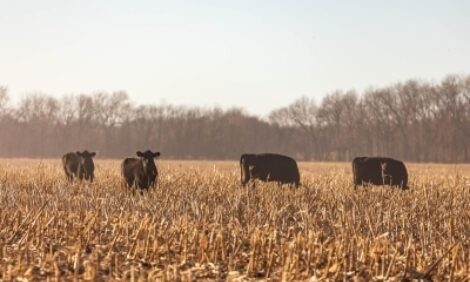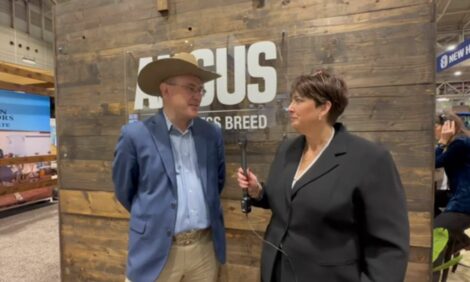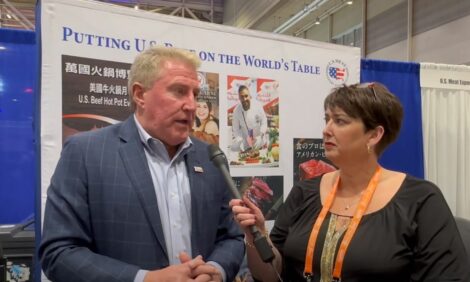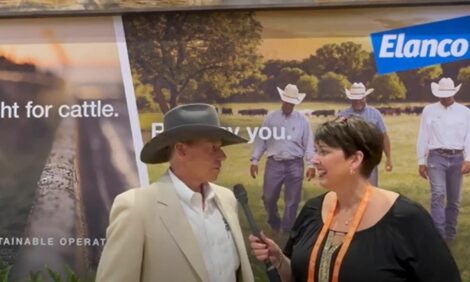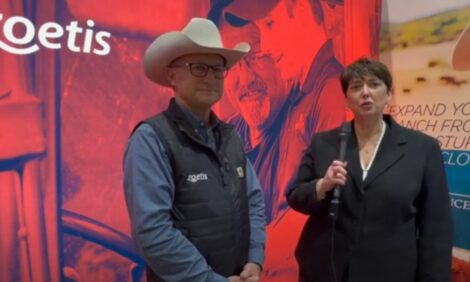



2023 NCBA: Christian Hansen launches Bovamine Defend Plus to feedlot market
New product translates to about 10 pounds of hot carcass weightPart of Series:
< Previous Article in Series Next Article in Series >
Dr. Steve Lerner, Senior Scientific and Business Advisor at Christian Hansen spoke to The Cattle Site’s Sarah Mikesell at the 2023 annual conference of the National Cattlemen’s Beef Association (NCBA) in New Orleans, Louisiana, USA.
New product for feedlot cattle
Bovamine Defend Plus is Christian Hansen’s latest science-based, research-proven probiotic product for feedlot cattle.
“Bovamine Defend has been in the cattle market for 25+ years,” said Dr. Lerner. “It’s got the lion's share of the business in terms of the value share.”
Producers rely on it to perform as typically expected of a probiotic, such as adding efficiency and providing weight gain. Christian Hansen has improved this already-proven product by adding two different species of Bacillus organisms.
“What makes Bacillus particularly good is its capacity to help digest feedstuffs like typical cattle feedlot finishing feed. It also has an impact on potentially harmful organisms like Clostridium,” explained Dr. Lerner. “By taking the existing organisms that were in Bovamine Defend with its proven record, we've created Bovamine Defend Plus and made the product substantially better, adding additional weight and additional efficiency, which translates to about 10 pounds of hot carcass weight.”
Probiotic benefits
When the animal industry was urged to begin considering alternatives to antibiotics or metaphylactic treatments, nutritionists and veterinarians turned to alternative solutions, such as probiotics, according to Dr. Lerner.
Effective probiotics can provide four major benefits:
- Improve digestion of feedstuffs by producing enzymes
- Support the function of the intestinal tract to improve absorption of nutrients
- Work with the gut to improve immune response
- Enhance the barrier function to keep pathogens out of the animal
“When you can get more nutrients from the feed and into the body, then you will allocate nutrients the way God intended for successful growth,” said Dr. Lerner. “If you're a beef steer, probiotics help you grow. If you are a cow, they help to produce milk. And if you're a chicken, they help you lay eggs.”
The primary role of probiotics is creating efficiencies and improving functions within all animals.
“Our job at Christian Hansen is to find those organisms with their unique genetic gifts,” he said. “Then take a deeper look into what they might give in terms of benefits.”
Once the benefits have been proven in Christian Hansen’s laboratories, then they can be placed in field trials and eventually be made available in the marketplace for producers.
“The real proof is in the pudding - getting an increase in performance in production animals,” said Dr. Lerner. “We believe that probiotics are an all-natural solution which our populace likes. If you get a better conversion of grass to beef, or in a feedlot, feed to carcass, then efficiencies are generated. Every time you can keep more hydrogen, oxygen and carbon in the animal, then there will be less methane and pollution released into the environment. Sustainability is also one of our measures, and we’ve been named the most sustainable bioscience company in the world for six years in a row.”
Probiotics and the microbiome
Christian Hansen still looks at the typical measures of the industry such as average daily gain, feed to gain ratio for efficiency, which typically translate into grade and dressing percentages.
“As a producer, you're hoping to get those demonstrable benefits,” he said. “However, there are other benefits, that you might derive from probiotics that you don't typically think about. We have a growing body of evidence coming from the human side, and some on the poultry side of a gut-brain microbiome axis. There's great evidence that if you improve the quality of the microorganisms, the microbiome, that improves the quality of the gut, which signals to the brain and animals may actually feel better,” said Dr. Lerner.
Thus, a healthy microbiome not only impacts physical well-being, as demonstrated by the typical measures, but also the mental well-being of the animal.
“Every time you can combine sustainability and good animal welfare, that's really what the industry should be looking for,” he explained.
For the last 30+ years, the industry has been talking about germs and how to kill them. Disinfection was the rule. You didn’t want to contaminate your hands or do anything unsanitary.
“Now we're understanding these trillions of bacteria that we have in and on us are absolutely essential to the quality of our lives,” said Dr. Lerner. “Great research has shown that a good microbiome, which is the collection of all these microorganisms, can actually impact things like the spectrum of autism, depression or schizophrenia.
“It's just remarkable what is burgeoning out of human medicine, that we, in animal care, can leapfrog to see if those same things apply to other mammals, such as beef cattle, or avian species. The overwhelming evidence to date shows that it does, so the animal industry can access these beautiful benefits.”
Lerner said the industry now considers the microbiome as its own organ. It weighs about as much as a human heart and it's conferring some reasonable benefits.
“It is just a matter of what the next 20 years are going to bring for microbiological science,” he said.


